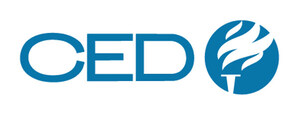
News provided by
Committee for Economic Development of The Conference Board (CED)Feb 27, 2020, 09:09 ET
WASHINGTON, Feb. 27, 2020 /PRNewswire/ -- The public and private sectors must work together to develop job-training programs that will meet the disruptive challenges of technological, demographic, global, and societal changes. And they will need to continuously do so, adjusting on an ongoing basis, in order to help Americans thrive in a fast-changing environment, according to a new Solutions Brief by the Committee for Economic Development of The Conference Board (CED).
Despite continued economic expansion, workers remain anxious about entering an era of increased risk of job-displacement, less career stability, and greater unpredictability overall. The fast-paced changes will inevitably affect which skills are in demand, what jobs exist, and which industries will thrive or shrink in the future. The Future of Work: How America Can Meet the Upskilling Challenge details how policymakers can encourage and leverage partnerships between businesses, academia, and other actors to deliver a job training system that more effectively helps both workers achieve their goals and the nation field a more modern, highly skilled workforce.
"Policymakers, business leaders, and educational institutions must come together, on an ongoing basis, to deliver modern job training programs that can help workers thrive at a time of rapidly-changing demand for new skills and competencies," said Lori Esposito Murray, President of CED.
The new CED brief issued these recommendations for policymakers:
- Encourage and incentivize employers, or consortiums of employers, to take responsibility for training their employees.
- Encourage public-private collaborations between business and educational institutions to better align new job skills with training programs.
- Help individuals pursue opportunities to upgrade or learn new skills.
- Develop online resources to help workers access information regarding job availability and in-demand skills to better match training programs.
- Expand eligibility for and access to publicly supported training, instead of focusing on narrow populations.
- Target incentives and other forms of aid to spur economic growth and job creation in the areas that need them the most.
- Evaluate and support the most effective training models to meet the needs of a wide range of workers.
- Lift regulatory burdens in areas that are most economically challenged.
- Reform tax policy to facilitate investments that maintain or modernize capital.
The new CED brief, The Future of Work: How America Can Meet the Upskilling Challenge can be read here.
About the 2020 Solutions Briefs
The 2020 Solutions Briefs are part of a series focused on non-partisan, reasoned solutions in the nation's interest. To be released over the next several months, they will address the central challenges we face in order to provide prosperity for all Americans.
About CED
The Committee for Economic Development is the Public Policy Center of The Conference Board that delivers well-researched analysis, and non-partisan, reasoned solutions in the nation's interest. www.ced.org.
About The Conference Board
The Conference Board is the member-driven think tank that delivers trusted insights for what's ahead. Founded in 1916, we are a non-partisan, not-for-profit entity holding 501 (c) (3) tax-exempt status in the United States. www.conference-board.org.
SOURCE Committee for Economic Development of The Conference Board (CED)







Share this article